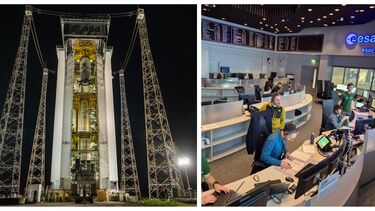- World’s first mission to map the globe’s forests in 3D from space will use cutting edge technology to inform climate change policies and protect future generations
- Conceived by the University of ∫˘¬´”∞“µ‚Äôs Professor Shaun Quegan and built in the UK, the mission will revolutionise our understanding of the volume of carbon held in the most impenetrable tropical rainforests on the planet
- The mission represents the result of decades of groundbreaking collaboration with leading European and US scientists
A satellite conceived at the University of ∫˘¬´”∞“µ and developed by British academics and engineers is set to become the first in the world to measure the condition of the Earth's forests from space.
This work will be crucial in furthering understanding of how tropical forests are changing to protect future generations from climate breakdown and accelerate the transition to net zero.
From conception to construction, the satellite – called Biomass – has been primarily built in the UK, capitalising on the UK’s industrial and academic expertise in space technology while opening up new opportunities to attract future backing from global investors watching its landmark launch on 29 April.
Throughout construction, it has supported approximately 250 highly skilled jobs at Airbus UK, in Stevenage, where it was manufactured, supporting the local economy and bolstering the UK’s 52,000 strong space workforce.
The Biomass satellite will launch from Europe’s spaceport in Kourou, French Guiana. Since 2016 the UK has won almost 91 million Euros in contracts for Biomass through its membership of ESA.
∫˘¬´”∞“µ‚Äôs Professor Shaun Quegan, joint lead proposer of the mission concept to the European Space Agency, said: ‚ÄúIt‚Äôs been a privilege to have led the team in the development of a pioneering mission that will revolutionise our understanding of the volume of carbon held in the most impenetrable tropical rainforests on the planet and, crucially, how this is changing over time. Our research has solved critical operational scientific problems in constructing the Biomass satellite.
“Conceived and built in the UK, Biomass is a brilliant example of what we can achieve in collaboration with our partners in industry and academia. The mission is the culmination of decades of highly innovative work in partnership with some of the best scientists in Europe and the US.”
Biomass is a hallmark of British innovation, facilitating jobs in everything from design and development to assembly integration and test. The satellite will create a 3D map of tropical forests after 17 months, then new (non-3D) maps every 9 months for the rest of the 5-year mission, providing insights normally hidden from human sight because of the difficulty in accessing these environments.
Its revolutionary technology will help scientists capture vital data on the changes to carbon in forests as ecosystems are increasingly impacted by deforestation.
Minister for Space Sir Chris Bryant said: "The Biomass mission showcases British ingenuity at its very best. Britain is not only stepping to the forefront of the space industry, but of global climate action too.
“Contributing to such great extent to a European mission set to deliver vital global results is testament to the UK’s industrial and academic expertise in space technology and will attract global investment into our vibrant space ecosystem, helping us boost growth and deliver our Plan for Change.”
Both deforestation, which releases carbon dioxide, and forest growth, which soaks up CO2 from the atmosphere, are crucial parts of climate change. Data on the biomass of tropical forests is very limited because they are difficult to access.
The Biomass satellite will be able to penetrate cloud cover and measure forest biomass more accurately than any current technology, which only see the top of the canopy. By providing better data it will help create a more accurate global carbon budget and better understanding of carbon sinks and sources which will help in developing and implementing effective strategies to achieve net-zero goals.
Observations will also lead to better insight into the rates of habitat loss and, as a result, the effect this may have on biodiversity in the forest environment.
Dr Paul Bate, CEO of the UK Space Agency said: “The Biomass satellite represents a major leap forward in our ability to understand Earth’s carbon cycle. By mapping the world's forests from space in unprecedented detail, it will provide critical insights into how our planet is responding to climate change — helping scientists, policymakers, and conservationists take informed action. We’re proud of the leading role the UK has played in this important mission.”
Kata Escott, Managing Director of Airbus Defence and Space in the UK, said: “Biomass is a groundbreaking mission that will advance our understanding of how carbon is stored in the world’s forests – delivering crucial data in the fight against climate change. With more than 50 companies involved across 20 nations, the team in Stevenage has shown exceptional leadership in delivering this flagship ESA mission.”

